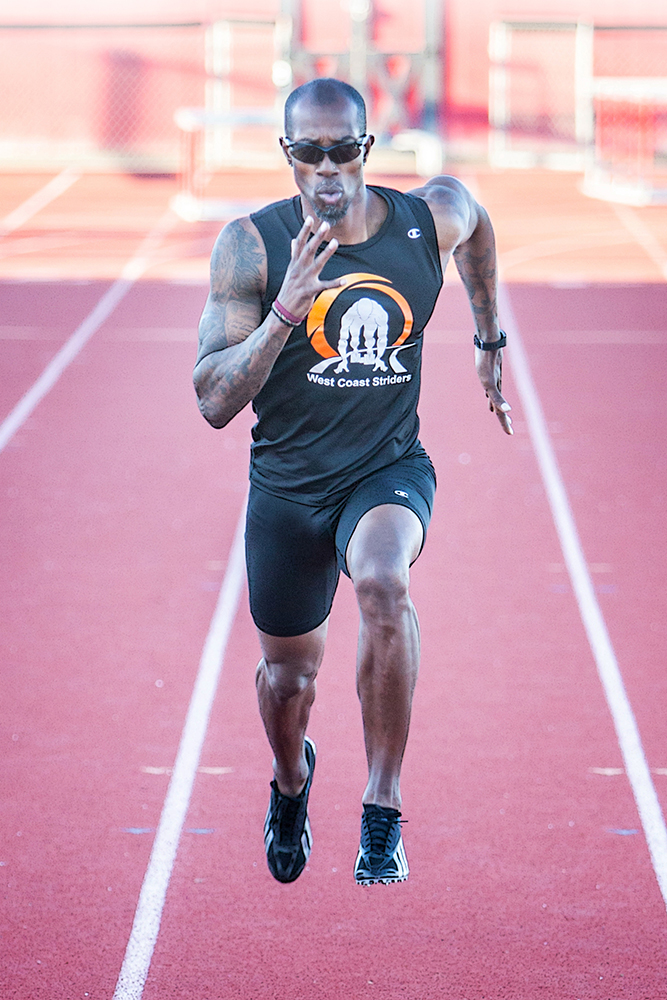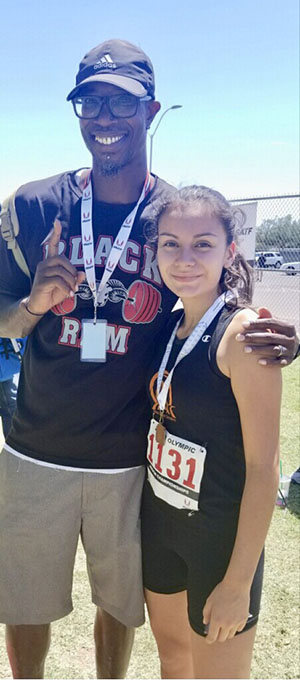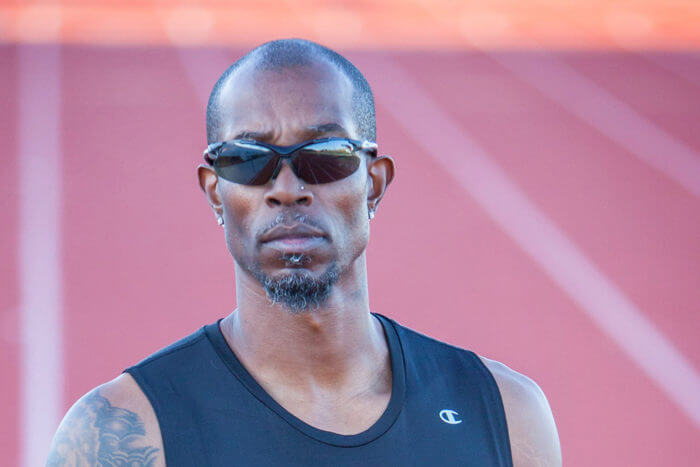He may have come late to track and field, but Corey Nelson has kept going and going … and going.
In his second year as head coach of Maricopa High School’s track and field program, after two years as its sprint coach, Nelson has coached kids to gold medals while continuing to compete at the Masters level himself.
Nelson has been training for the USA Track and Field Arizona State Championship that was planned in late May and then the USATF Masters Outdoor Track and Field Championships in North Carolina in July. He was trying to raise funds for the World Masters Athletics Championships in Toronto, Canada, but those events were canceled due to the COVID-19 pandemic that made older participants particularly vulnerable. Then he watched the novel coronavirus demolish the high school track and field season as well.
On the masters’ circuit before coaching at MHS, Nelson was a three-time gold-medal winner in the 2014-15 season in the 35-40 age bracket.
He’s been running track more than 20 years.
He had a gift. He made it look effortless.
“I was a late bloomer. Didn’t start track until I was a junior in high school,” Nelson said.
He was a football player at Rancho Cotate High School in Northern California and known for getting in a little trouble during the off season. The head coach less than subtly suggested he try track to keep in shape and out of trouble.
“So, I said, ‘OK I’ll try it.’ I turned out to be pretty good at it, so I stuck with it,” he said. “And learned how to sprint. Learned how to breathe, how to use body mechanics, and the rest is history.”
Matt Transue was a friend and teammate at Rancho Cotate.
“Even in high school, we all knew Corey had something special,” he said. “He had a gift. He made it look effortless.”
Transue and the other throwers on the team would stop what they were doing and gather along the track to watch Nelson run the 200.
“The [runners] would come off the corner, and everyone else would be grinding and grunting, and he looked as though it was just a job. He had such fluid motion, he looked as though he had just woken up. He was amazing.”
Transue said Nelson was confident with “a glow around him” but did not have the swagger of arrogance he saw in many high-performance athletes.
Nelson set school records in the 200 and 400 and was a state qualifier in the 400. Then, at Santa Rosa Junior College, he set a school record and earned All American honors.
He’s a lot more talented than even his accolades tell.
He then went on to Boise State University, where he played football and had a blazing-hot track season in 1999. He still holds the BSU record in the 400 (45.36) and is tied for second all-time in the 200 (20.57). He made Nationals in both events and was named All American in both. Nelson was also the Big West Conference Men’s Outdoor Track and Field Athlete of the Year.

Amy Christofferson, his sprint coach senior year, said Nelson was one of the most talented athletes she ever worked with.
“He’s a lot more talented than even his accolades tell,” she said. “He doesn’t always believe in himself.”
That is something she suspects came through the pecking order of junior-college track. Christofferson said trust quickly built between them. He became like one of the family.
After college in 2000, he qualified for the Olympic trials and was on the 4×400-meter relay championship teams in the Penn Relays and the Texas Relays.
He briefly went back to football. After signing with the Seattle Seahawks, he was injured and released. In the XFL he was a wide receiver for the Las Vegas Outlaws in 2001. The next year, he played for the Amsterdam Admirals and the Scottish Claymores in NFL Europe.
Then he qualified for the Olympic trials again in 2004, chasing a dream that never quite died.
“He never quits,” Transue said. “He never gives up.”
When Nelson moved into professional ranks, Christofferson and her sons would show up to cheer him on. After he was done with football, Nelson returned to Christofferson for training.
“I was fortunate to go onto the professional ranks and have a medium-sized career,” Nelson said.
He was an indoor national qualifier in 2003, 2004 and 2005. On the pro circuit, he called it “dash for cash” as athletes tried to earn enough to at least earn their keep as they traveled internationally.
With USA Track and Field, he rubbed shoulders with childhood idol Michael Johnson nearing the end of his career. He was teammates with the great John Capel, Tyree Washington, Terrence Trammell, James Davis, Antonio Pettigrew, Dennis Mitchell and Derek Brew. They qualified for the Penn Relays and won gold in the 4×400 at the Drake Relays.
I coach people how I would like to be coached.
Christofferson was not surprised to see him become a coach (he was an undergraduate assistant sprint coach), and she continues to give him advice in that realm.
“He’d come to me and say, ‘How did you do this? After one year, I’m worn out,’” she recalled. “You have to have patience. You’re going to find a lot of diamonds in the rough.”
Nelson reiterates Christofferson’s advice that a coach cannot write a program for one athlete that everyone else will fall in line with. She had to give him different challenges than she did other athletes she trained.
He became a sprint coach at his alma mater back in California and then was head coach for a couple of seasons at El Molino High School before moving to Arizona and coaching sprinters again at Independence in Glendale.
“I coach people how I would like to be coached,” he said. “I communicate everything, maybe too much.”
But he was also feeling the competitive bug.
“I get the itch every year,” he said. “I’d call up my old coaches and say, ‘I still got it. I’m running with these high school kids and I’m beating them.’ Of course, nowhere near where I was.”
On the USATF Masters circuit, competing in the 35-40 age category, Nelson earned silver in the 200 indoors and gold in the 400 indoors during the 2013-14 season. Then he won gold in the 200 and 100 in the Grand Canyon State Games and the 200 in the Arizona State Games the next year.
Dempster Jackson, founder of the AAG Elite Club that became Phoenix Elite, pulled Nelson into the club to run the 200 and 400.
“He was an exceptional athlete,” Jackson said. “I thought he had a lot of gas left in the tank.”
Club track gives high-level athletes who have to train on their own the opportunity to compete. The club would get free training, travel, and fitness and massage therapy. In exchange, the athletes would train those in the youth program.
“It was a symbiotic relationship,” said Jackson, a former Masters champion.
He said many of the athletes in the club were a little younger with some attitude. Nelson, he said, calmed that down. “He had a good deal of discipline. He was always open to coaching and collaborating. It was very beneficial to have him on the team.”
Guy Muhammad, now coaching Pima Community College, trained Nelson five years ago with Phoenix Elite.
“He’s committed, he’s dedicated, he’s knowledgeable. He competes at a high level,” he said. “As a coach he’s very much the same. The kids I’ve gotten from him have been very coachable.”
Those kids include Pjai Austin, who is excelling in competition for the University of Arizona.
He’s teaching and he’s still doing it himself. That’s awesome.
Sherry Dunn, who has two sons running for Nelson, said kids who achieved under his coaching have gone on to even higher competition, including Austin and Jacob Cowing, who were state champions with MHS’s 4×100 relay team two years ago. Cowing now plays football for University of Texas-El Paso.
“He’s someone who’s willing to work with the children,” Dunn said of Nelson. “If you want to work, he’s going to help.”
Dunn’s son Mister Chavis, an MHS junior and member of the West Coast Striders, has a good shot at making a college team in track and football, according to Nelson. Dunn said her kids have responded well to Nelson’s fairness, structure and demand for accountability. “You know how there are some people in life you don’t want to disappoint? He’s one of them.”
She said Nelson listens to her concerns in helping Mister reach his goals.
“Those kids respect him,” she said. “He’s teaching and he’s still doing it himself. That’s awesome.”
Don Abram is head coach of the girls track team at McClintock High School. He’s been training runners 33 years. He coached Nelson in his efforts with USA Track and Field.
“He was a really, really good, but to maintain that and live a life is really hard,” Abram said.
He saw Nelson still had the bug and the passion to compete.
“He’s a hard worker, maybe a little bit too hard on himself with a kind of chip on his shoulder,” Abram said. “He has that unfulfilled demon in him about the sport. It’s a good demon. That’s why he’s doing Masters. “
Coming to Arizona, Nelson said, was all about chance.
“We had a dart board with Arizona, Nevada and Oregon,” he said. “We said, ‘Wherever the dart lands that’s where we’re moving.’ So, Arizona.”
“We” is Corey and his wife Danielle Nelson, whom he has known since they were in junior college together. They drifted apart when he went off to Boise but “circled back around” about six years ago. They have two children.
While Danielle is part of the administration of the Phoenix Premium Outlets, Corey is teaching and assisting in the special education department at MUSD.
Starting in 2014, he gradually took on four coaching roles, all of which he continues today. He formed a nonprofit track club called the West Coast Striders to train runners from elementary-aged kids to adults. He became a sprint coach at Mesa Community College. After two years as sprint coach for MHS, he became head coach in 2017 as well as a soccer conditioning coach. This year he was also the assistant coach and defensive coordinator for Sequoia Pathway’s football team.
Sueann Chavez’s daughter Gianna runs in the 11/12-year-old bracket for the West Coast Striders after telling her parents one day she wanted to give running a try. Chavez said it was quickly obvious the club was a good thing for her kid, who expects to reach new levels this year.
“Corey and his wife Danielle, it’s hard to find that kind of commitment,” Chavez said.
Gianna, a student at Legacy Traditional School, competed in the USATF Hershey Junior Olympics Track and Field Championships last summer in the 800 and 1500.
At the same time, he has returned to training for the Masters circuit. He recently moved into the 40-45 bracket, where he dominated.
The thing about age, Nelson discovered, is the much longer recovery times. He was referred to Fast Athlete USA in Tempe and its isokinetics training as a way to adapt to the change. That includes a circuit of all-hydraulic equipment.
“At first, I thought he was standoffish and quiet,” owner Lara Clark said. “Then when you get to know him you learn he’s in a zone when he’s training. He’s in his own head.”
She said the Fast Athlete staff “really likes Coach a lot.” Though the facility is mostly focused on youth athletes, it sees its share of adults like Nelson training for elite competitions along side Olympic hopefuls or free-agent football players.
Whether you’re a miler, whether you’re a sprinter, whether you’re a jumper, whether you’re a thrower, there are just so many different events you can experiment with and find your niche.

Zanaa Ramirez, 18, was one of the first athletes to join the West Coast Striders. She is now a senior at MHS and one of the top point-earners on the girls’ team in the 400 and 800. She has been running cross country since attending Butterfield Elementary.
When Nelson became the sprint coach for MHS, Ramirez was a sophomore distance runner and had no interaction with him. “The other kids really liked him,” she said.
But he had been watching and saw her natural potential for different distances.
“He set me aside, and we had a conversation during one of the meets,” she said. “He told me I was a really good athlete and he could help if I was willing to trust what he had to say.”
With the Striders last year, she earned a spot in the USATF Hershey Junior Olympics Track and Field Championships in the 800. For MHS, she hit her personal best time 2:29.63 in winning the Southeast Valley Championships.
“One thing about tracks is there are just so many events,” Nelson said. “Whether you’re a miler, whether you’re a sprinter, whether you’re a jumper, whether you’re a thrower, there are just so many different events you can experiment with and find your niche.”
Zanaa’s mother, Inez Ramirez, said Nelson was “really determined to give these kids exposure that they didn’t have in Maricopa. If he doesn’t have a certain resource, he’ll find it for these kiddoes.”
The fact Nelson continues to compete helps them identify, she said. “He’s going through the same training, the same problems. They can see he’s not all talk.”
Jovanni Fontes also competes for Nelson at MHS and for the club team. He said Nelson’s philosophy of “Quality over quantity” helped him improve tenfold.
“He has taught me how to give it all my all and when my body feels like it’s at its limit,” Fontes said. “I’ve learned it’s only a portion of what I can really do.”
They are taught to arrive with the mentality of “We will do our best. We will be great, and we will win,” Fontes said, explaining it spills over into everyday life.
“But arguably the most important thing he has taught us that it is OK to have an off day, to have a bad race, to feel not OK,” he said. “You just have to get back up again, fall forward and use that momentum to drive you because only we can choose to be great.”
Nelson also emphasizes academics comes first.
“To put themselves in a position for success, they have to be academically eligible. If you’re ineligible, obviously you’re not in position for success,” he said. “Secondly, consistency. They have to be at practice as much as they can if not everyday and be consistent with the routine and be progressional. Last but not least, have fun. If you’re not having fun, then you’re probably not going to win. If you’re not going to win, you’re probably not going to have success.
“Winning’s not always a gold medal. A PR is a win. A season-best is a win. Staying healthy the entire season is a win. Gaining teammates and friends is a win. Gaining a social group is a win.”
He taught me not to cheat myself, not to quit myself.
Ebony Griffin, 16, is a junior a Maricopa High School. She runs the 400, 200, 4×200 relay and 4×100 relay. She moved to Maricopa from Oklahoma her sophomore year and was excited to get more training for her running.
“He seemed very quiet and straight-forward,” she said of Nelson. “He’s very hands-on. I improved very much.”
Griffin and her teammates say they set their own goals, and Nelson works with them to achieve those goals.
“He’s helped me overcome some of my fears,” Griffin said. “Definitely taught me to keep trying and trust the process.”
Coreyuna Mitchell, 18, an MHS senior, moved to Maricopa from Michigan last year and also had the stress of adjusting to a new school and new people. But she found new friends on the track team, where she runs the 400, hurdles, 4×400 relay and 4×800 relay.
“He takes a lot of things seriously, but he’s a very good man. He cares about us a lot,” she said. “He’s a very caring man. He taught me not to cheat myself, not to quit myself. He’s amazing.”
When Nils Thibeaux brought his three sons to West Coast Striders, he brought with him a wealth of experience himself coaching baseball, basketball and track.
“Track’s been a big part of our lives for eight or nine years,” Thibeaux said.
He was immediately impressed with how detail-oriented Nelson was. He spoke to the Striders about physical adjustments and balanced upper body strength, using techniques even Thibeaux did not know about.
“I thought, ‘Hey, this guy’s a professional,’” he said. “He’s a great track coach. And he’s still running track himself.”
Several parents said the fact Nelson is still competing and working on goals makes an impression on his athletes. And not just kids.
Frank Juarez, who ran cross country at South Mountain High School and Phoenix College, now has two of his kids running for the Striders and a third hoping to join when he is 8. His children attend Heritage Academy, where there is cross country but not track.
“I didn’t know his experience. My first impression was that he knows what he’s doing,” Juarez said. “He’s organized and structured. He seems to get the most out of them.”
John Hill is the father of Jaemin Hill, 14, a student at Heritage Academy. Jaemin competes in the 100 and 200 with the Striders.
Hill said no one even had to point out who the coach was, because he could tell by the way Nelson carried himself and interacted with the athletes. Hill, who coaches club basketball, said he was impressed with the organizational discipline of the Striders.
“He and the other coaches demand effort and single-minded focus each and every practice and yet do so in a supportive, encouraging and motivating way,” Hill said. “Even in a sport that is often individually based, he successfully creates a team atmosphere. The coaches, peers and culture of the program push each child to want to get better. And if you listen and follow him you will get better.”
When Jaemin started feeling some aches and pains, Hill noted, Nelson told him to back off for three weeks or so instead of pushing him to do something unhealthy.
“The little details separate winners and losers in track more than any sport, where a hundredth of a second can be the difference in winning and losing, and coach Nelson is all about those details,” Hill said. “It’s not so much about doing everything perfectly as it is the process of each and every day doing things right, doing all the little things right, and building on that in the endless journey to be the best you can be.”
Ailed Cota, a junior, runs for Nelson at MHS and with the West Coast Striders in the 800, 1600 and 3200.
“Track overall has made me improve on myself and my motivation,” she said. “He works on us to get better and get better times. That’s helped me a lot.”
Meanwhile, because he is a self-described shark that doesn’t sleep, Nelson also gained certification to officiate Arizona Interscholastic Association meets that don’t involve Maricopa and another certification to officiation at the USATF level, including NCAA and professional meets.
“I may not have made an Olympic team, but I might officiate one,” he said.



